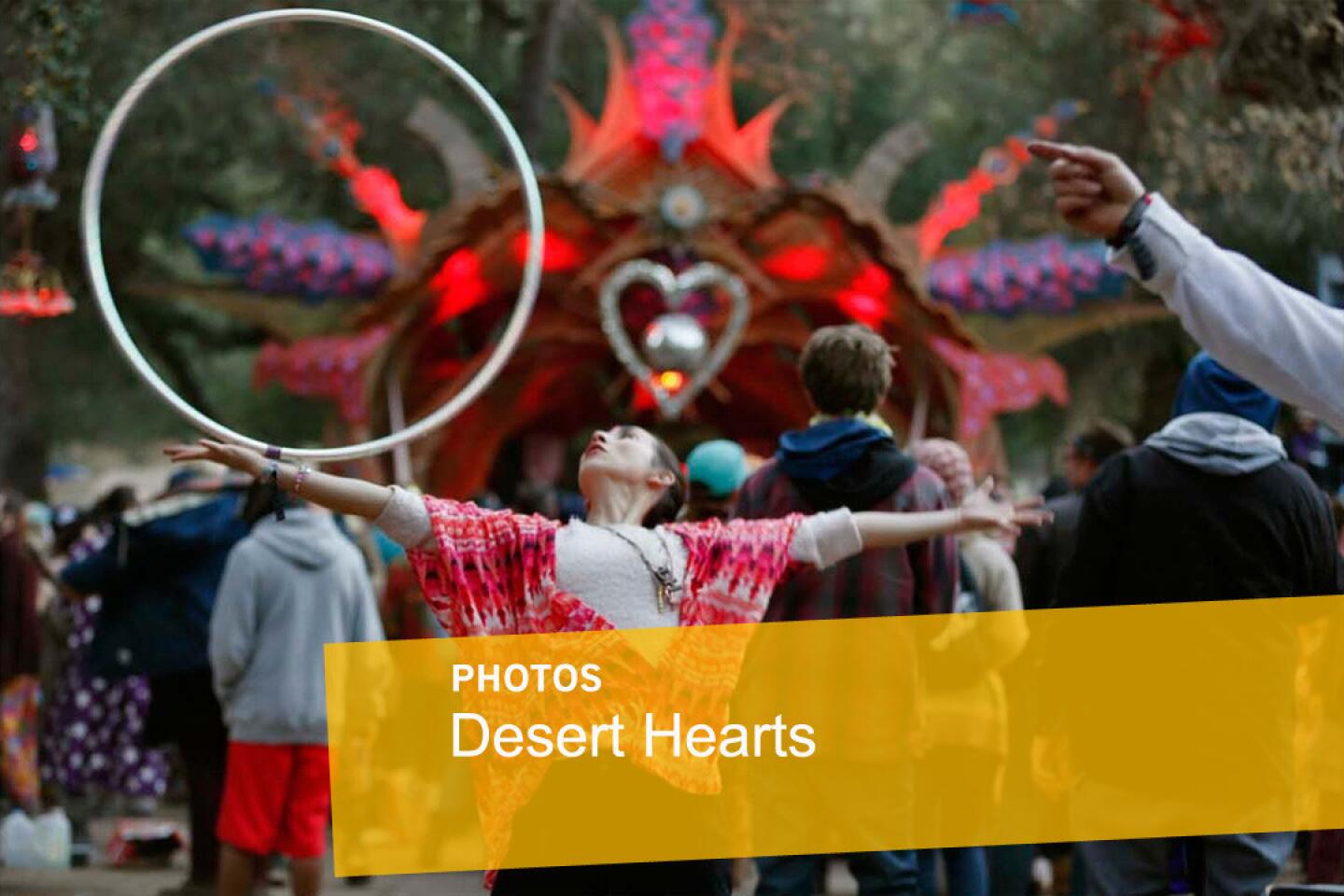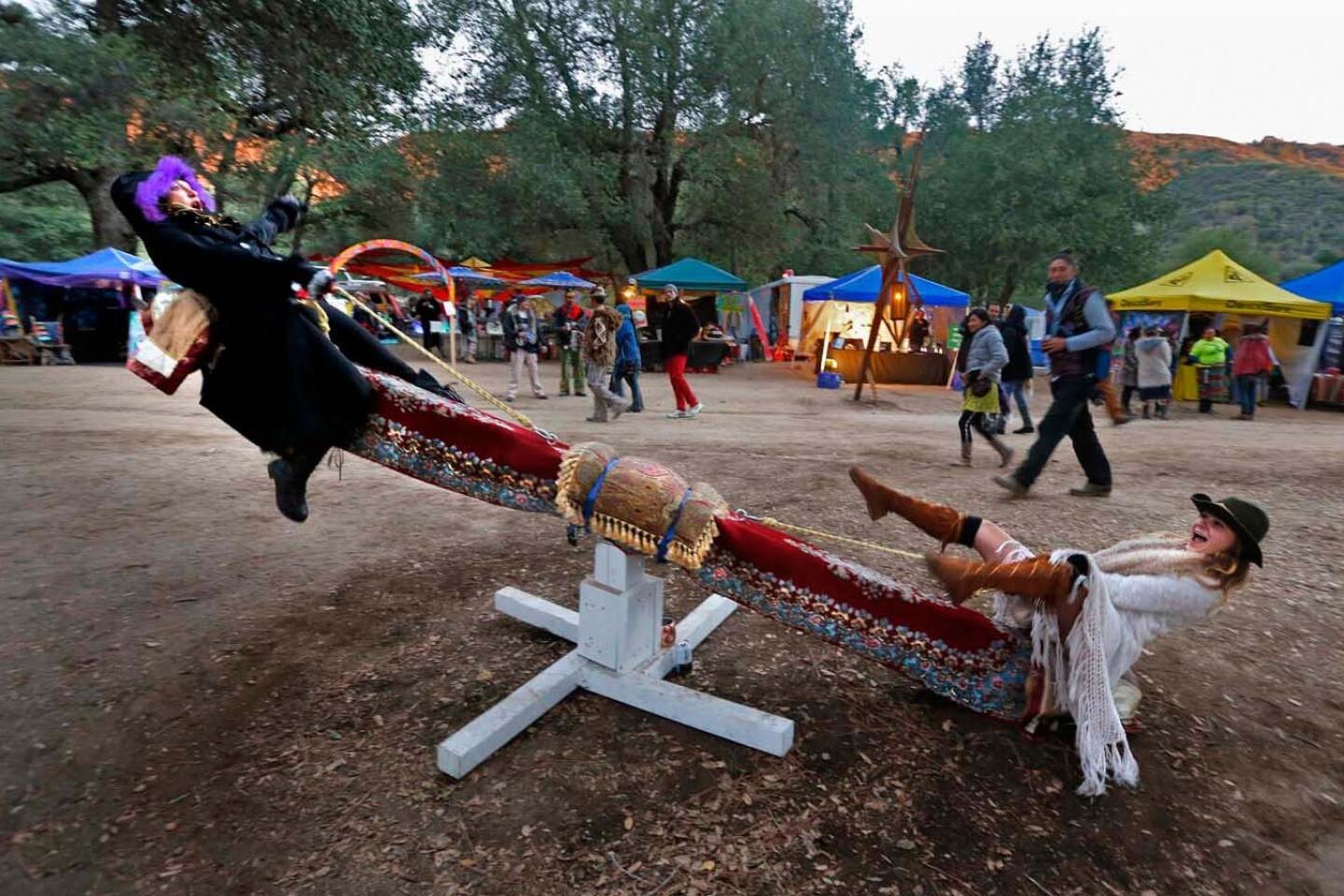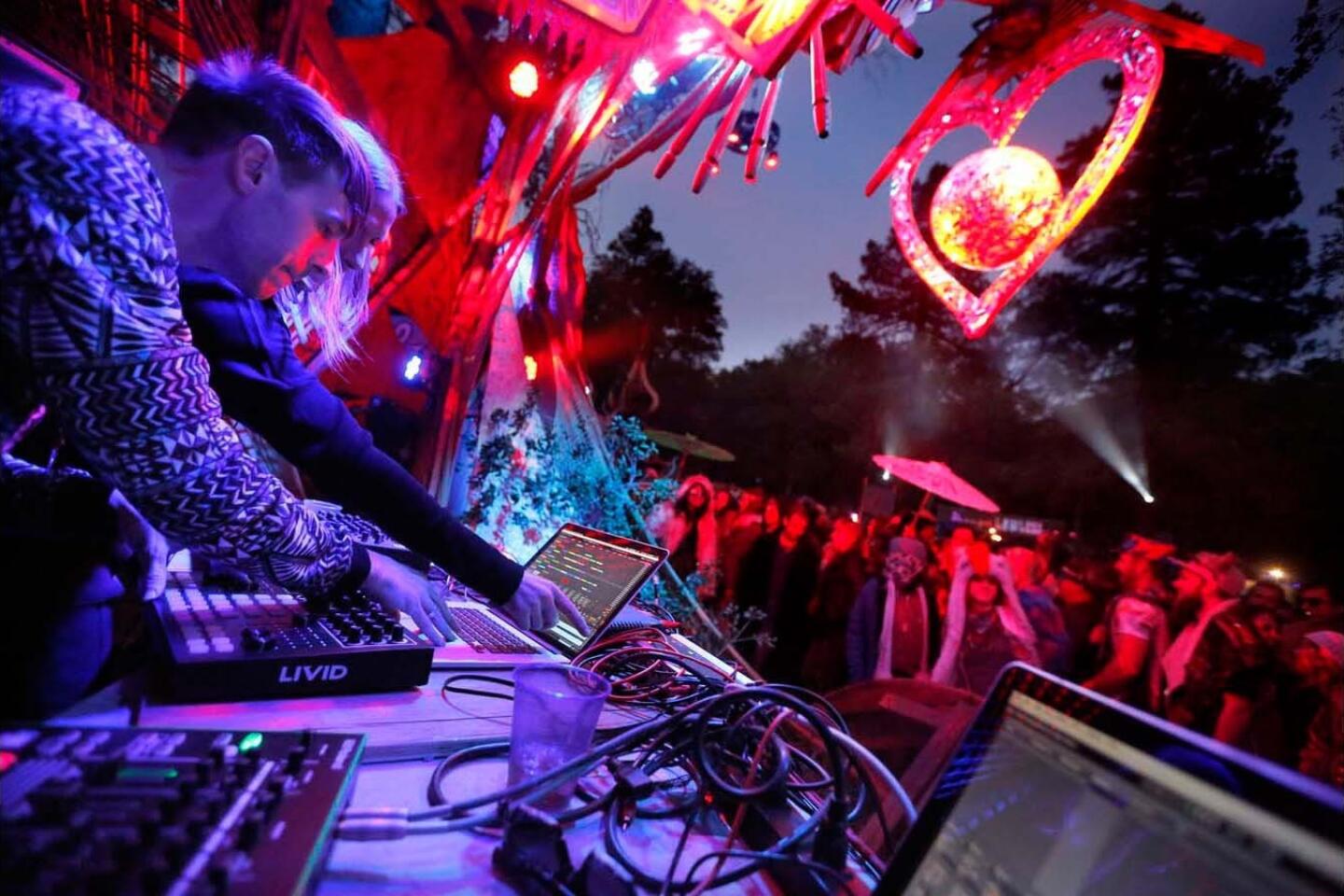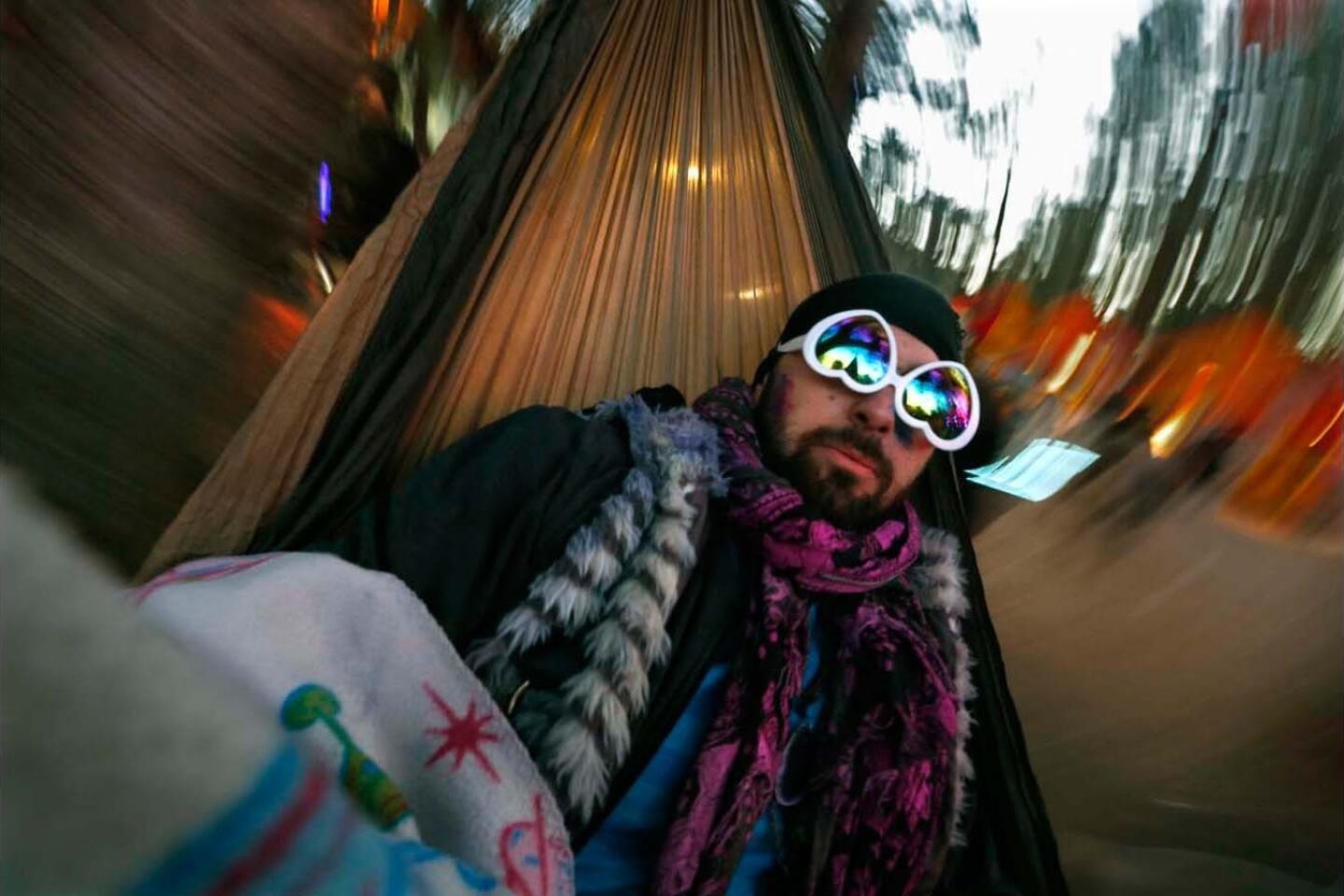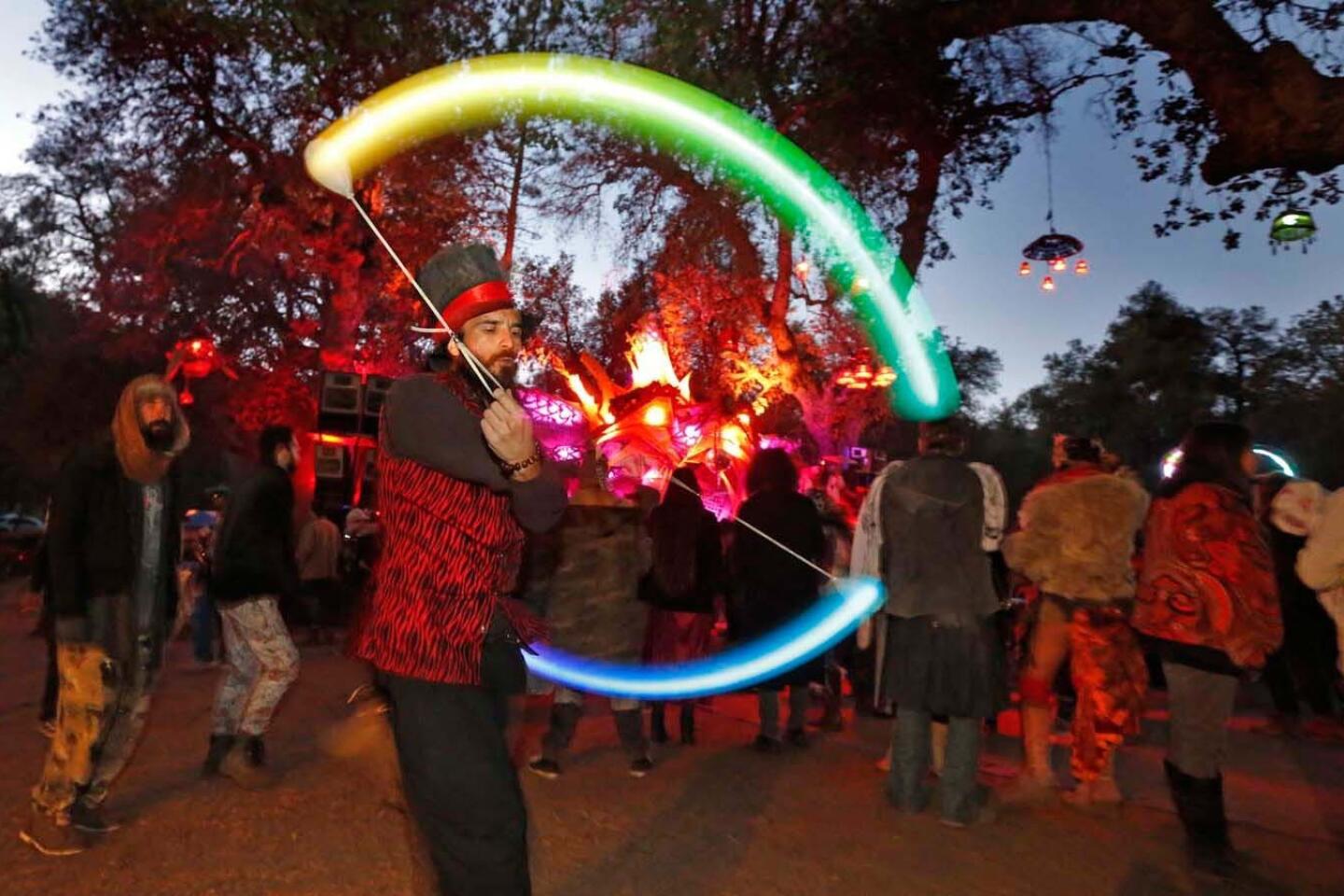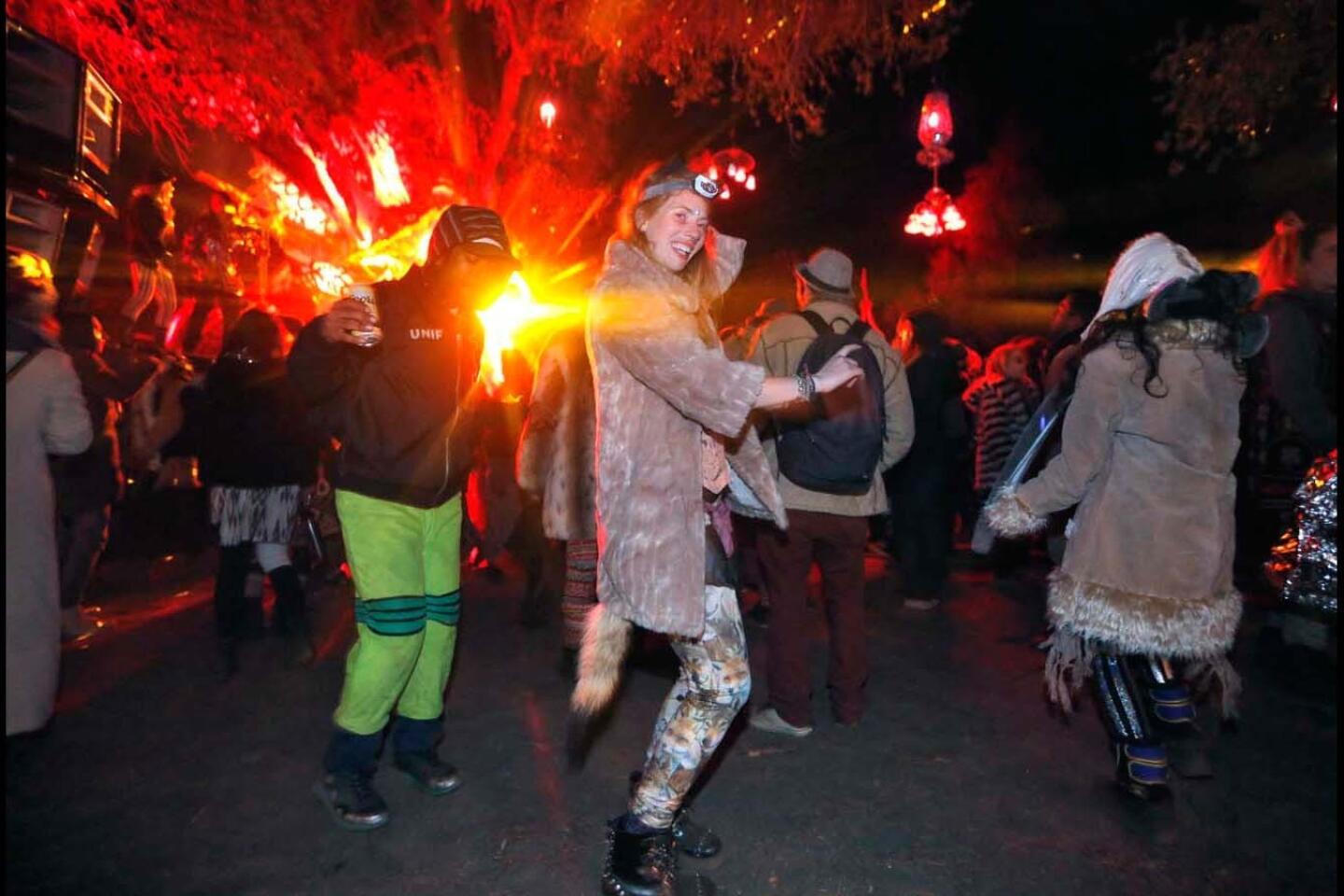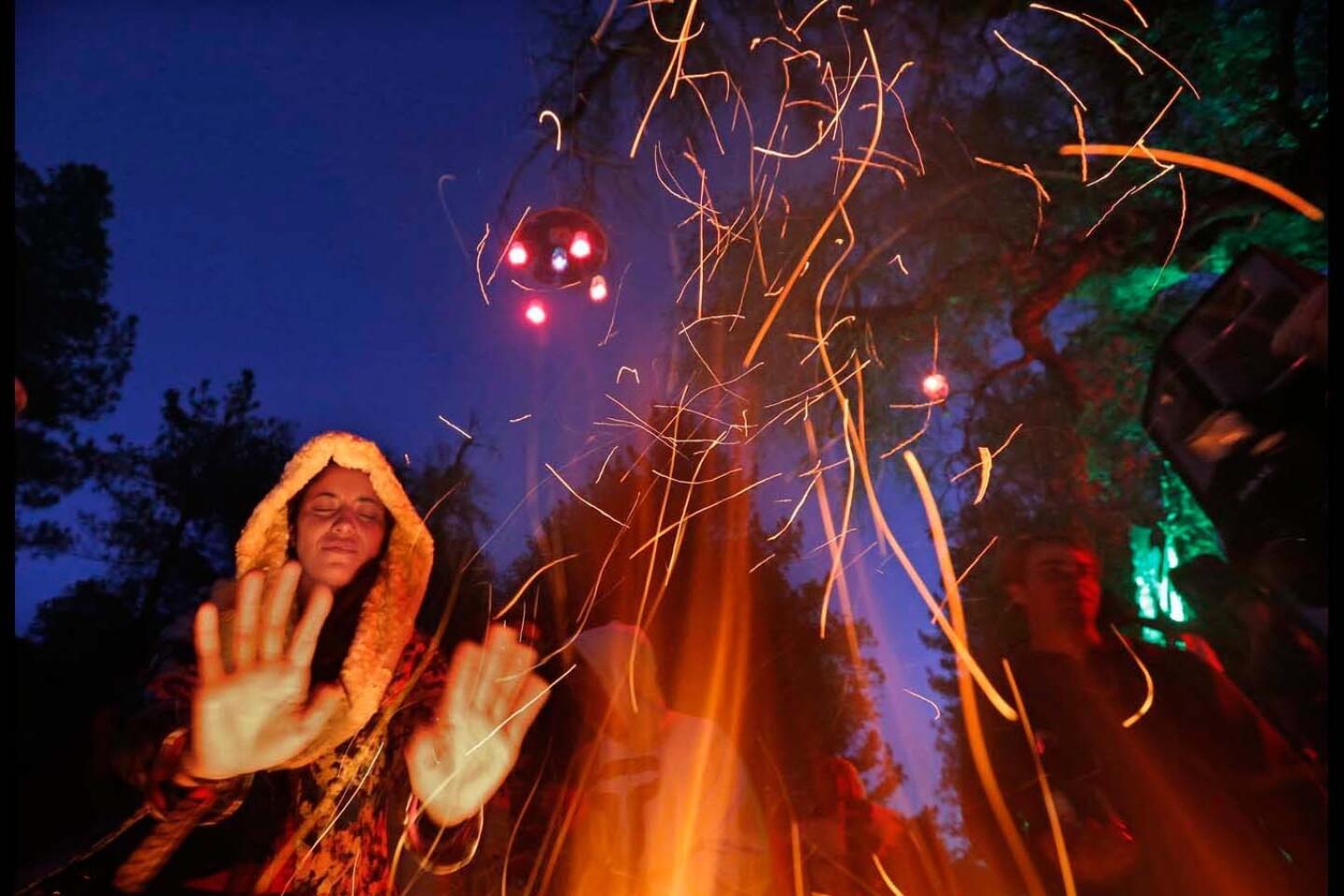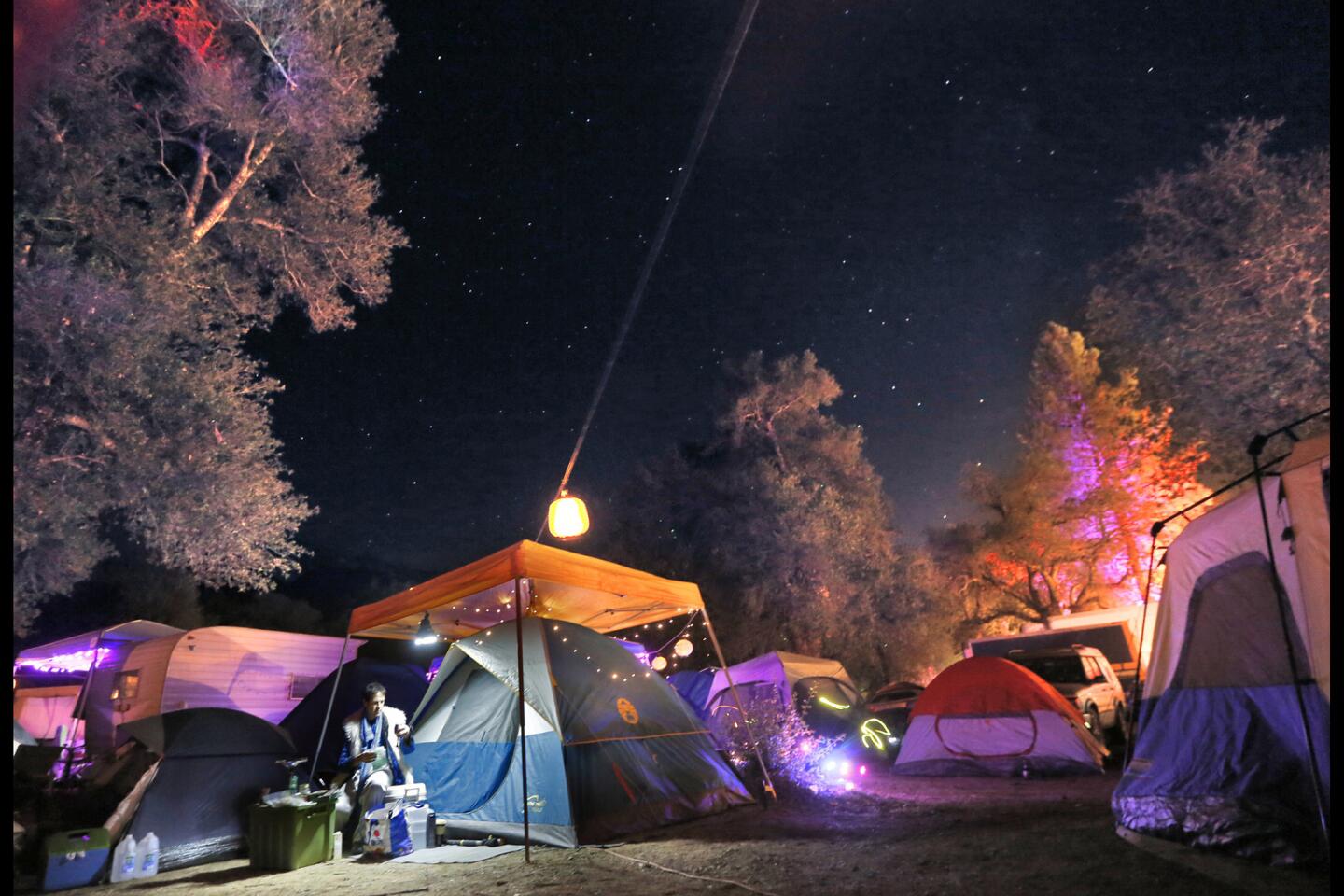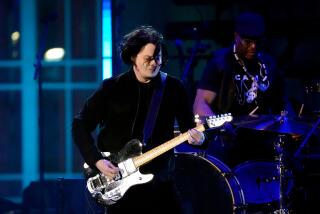Back to nature, back to the music: Desert Hearts upends the luxe EDM fest model
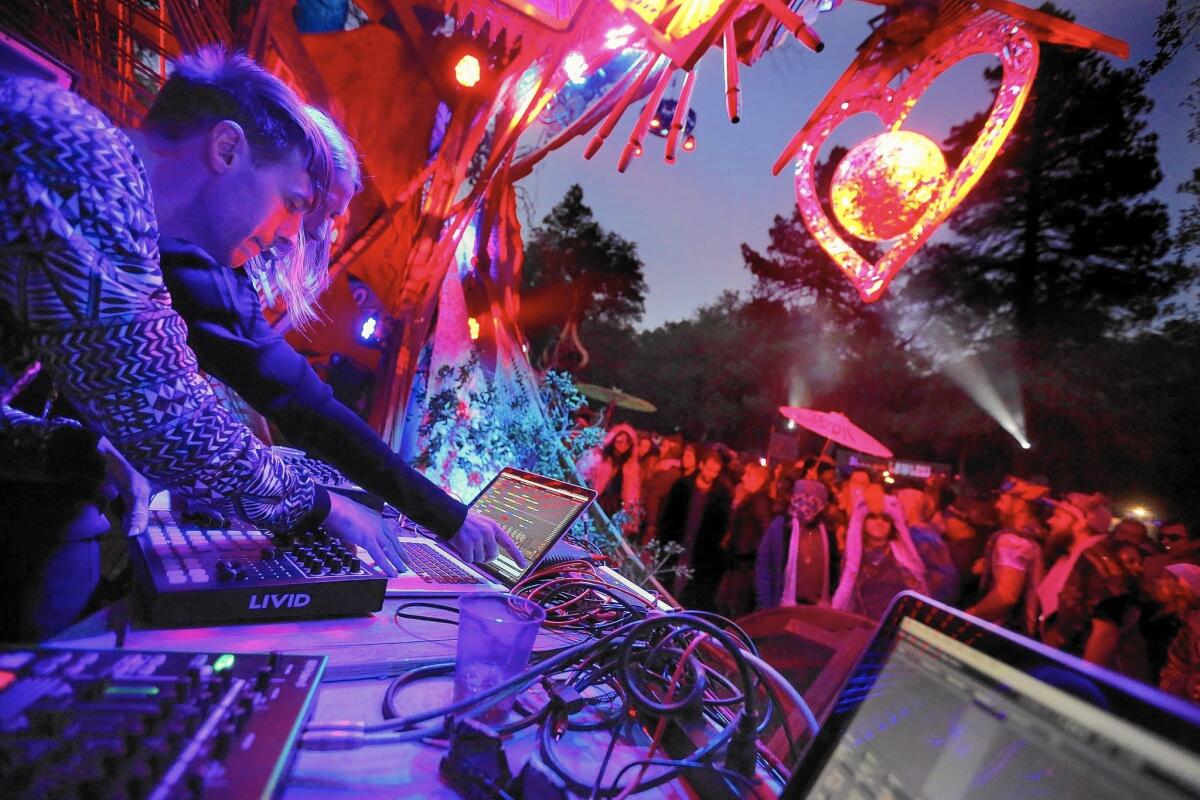
- Share via
It was 10 p.m. Friday, and we were a half-mile away from the main campgrounds at the Desert Hearts music festival in the Los Coyotes Indian Reservation, deep in San Diego County, when we spotted the bear.
Its fur mottled with twigs, the animal, about 6 feet tall, approached in total silence, save for the rustling of leaves. As it crept closer, we could see its hot breath steaming in the chilly night air.
“Hey,” it said. “I’m Greg.”
This was no bear. It was a raver in a full-body Chewbacca costume, looking extremely lost.
Such was last weekend’s Desert Hearts, the third anniversary of the wild and woolly — and increasingly influential — outdoor electronic dance music festival. In just a few years time, its team — five San Diego techno-weirdos (four twentysomethings and a gray-bearded paterfamilias almost twice their age) — has reimagined the idea of an electronic music festival in 2015.
As major EDM events such as the Electric Daisy Carnival and Hard Summer draw hundreds of thousands of fans, they also face major security concerns and questions about their viability. There’s a sense that as the genre has expanded, it’s come at the expense of young fans’ joy and discovery.
SIGN UP for the free Essential Arts & Culture newsletter >>
Rooted in Burning Man’s off-season party circuit, Desert Hearts may be the only Southern California festival to stir those feelings. It’s big enough to attract Coachella-caliber talent like Claude Von Stroke, Doc Martin and J.Phlip, but unlike Coachella with its luxe VIP packages or Electric Daisy Carnival with its helicopter Champagne soirees, Desert Hearts is so off the grid geographically that cell service — and sharing selfies — is impossible. Everyone, including the organizers, sleeps in tents or at best an RV. Set times are almost illusory — the bass-heavy kick of house and techno music is a 24-hour-a-day affair.
Desert Hearts may be Southern California’s most exhausting, delirious proposition in dance music, but it also represents a new subculture that’s upending what fans want from festivals.
We only want one stage. Seeing how that works completely changed our lives.
— DJ Mikey “Mikey Lion” Leon
The commute to Desert Hearts culls out the amateurs. From L.A., it was almost a six-hour drive in traffic on Friday night to get to the festival site (festivities lasted from Thursday afternoon to Monday morning). But 3,000 ticket holders made it, just as temperatures dropped into the 30s at night.
And give or take a wanderlusting Chewbacca, the crowd took care of itself. In more than 72 hours at Desert Hearts, I didn’t see a single fight, medical emergency or anything that would be out of place at a particularly free-spirited barbecue (representatives of the fest reported no arrests or injuries, and the San Diego County Sheriff’s Department confirmed it received no calls for service). The few local police on hand from the Los Coyotes reservation mostly stayed in their cars and looked bemused by the whole thing.
“I’m sure you’ll stay busy with that thing,” one said to a writer holding a camera.
That such an audacious festival can go so smoothly is a testament to its founders. The San Diego-based DJ crew of Mikey “Mikey Lion” Leon, David “Porkchop” Leon, Ryan “Deep Jesus” Orey, Matthew “Marbs” Marabella and Lee Reynolds formed when the members combined their separate club nights in San Diego. While the city has become a hotbed for electronica (with gatherings like CRSSD Fest and clubs like Bang Bang), their Burning Man experiences led them in search of something wilder.
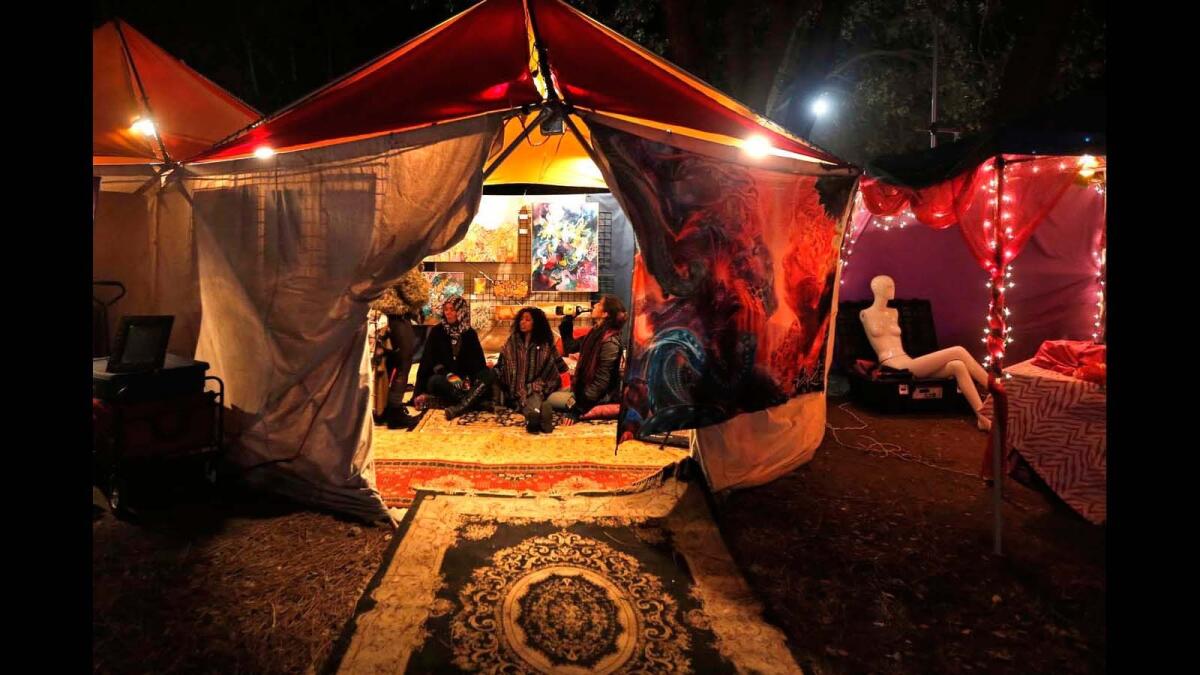
Sharing a drink in the Dreamscape Art Gallery at the Desert Hearts music festival on the Los Coyotes Indian Reservation near Warner Springs, Calif., are, from left, artists Jennifer DePina, 29, David Max, 29, and Nicolette Torres, 23. The five-day music and arts festival, which ended Monday, featured house and techno music.
They threw their first Desert Hearts three years ago, in similar circumstances but with markedly different expectations.
“It was like 20-degree weather, and because it was so cold, we all had to move the fire to the dance floor,” said Marbs.
“But as soon as the music hit,” said his partner Porkchop, finishing the story, “everything exploded and we partied until sunrise. That was the best night of my life.”
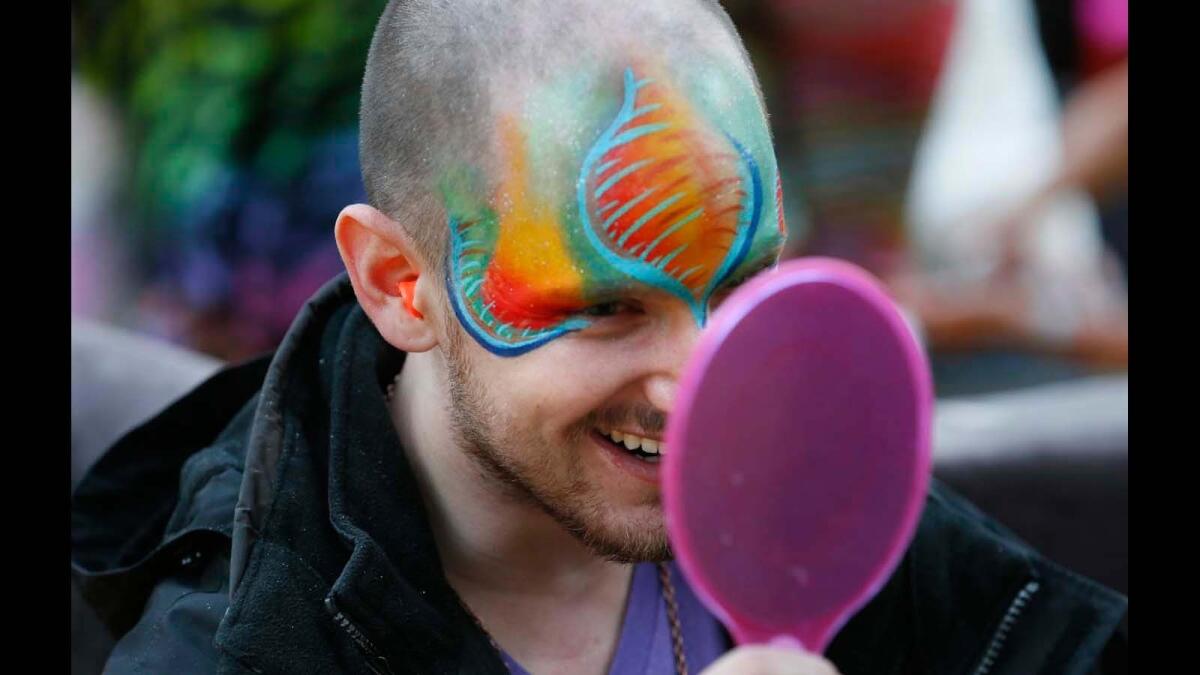
Dmitriy Klyagin, 25, of San Diego, checks out the paint job at the Desert Hearts music festival.
Despite the less-luxe feel of Desert Hearts, tickets still run $200 (versus $375 for Coachella), and anyone expecting a ramshackle hippie operation will be surprised by the sound, layout and production quality. The crew has tried to broaden its ambitions — it throws the fest twice a year, and in July it brought its club-focused City Hearts national tour to a sold-out Belasco Theatre in downtown L.A. — but it readily accepts that Desert Hearts, as a festival, has a ceiling.
“Anything over 3,000 and people wouldn’t feel connected,” said Lion, his Kool-Aid-green hair draped in front of Jackie O sunglasses. “We only want one stage. Seeing how that works completely changed our lives.”
Unlike other festivals competing in a market where anything less than constant growth constitutes irrelevance, Desert Hearts has a degree of difficulty that makes it purposefully harder to scale up. With electricity, showers, a curfew or a location closer to a city — let alone the influence of a Live Nation or AEG — it would lose something essential.
The drive into camp passed by a neon-flecked bazaar of stands hawking raver gear, vegan burritos and group tents where fans piled atop each other in cuddle puddles. The stage was a tangle of wood lattices, with lanterns strung in the trees and fans gathering behind the DJs on stage. Festival goers gave out free drinks and let strangers crash in sleeping bags beside them. For those used to the harsh security checks at contemporary raves and festivals, it was hard to believe how friendly it all was.
“We didn’t even bring a tent. We slept in one of the hosted tents and passed out with no plans,” said Jesse McKenzie of L.A. “I’m not using my mind at all when I’m here. Being out here and being off grid for 72 hours is the best thing. I’ll deal with it all on Monday.”
“My friends convinced me to go to the first one up by Victorville,” said Riley Simas, also of L.A., who was wearing a neon fuzzy blazer and cartoonishly huge sunglasses. “There were like 200 people up a dirt road on old farm. I had to camp next to a 600-pound pig. And now look, this is an international festival.”
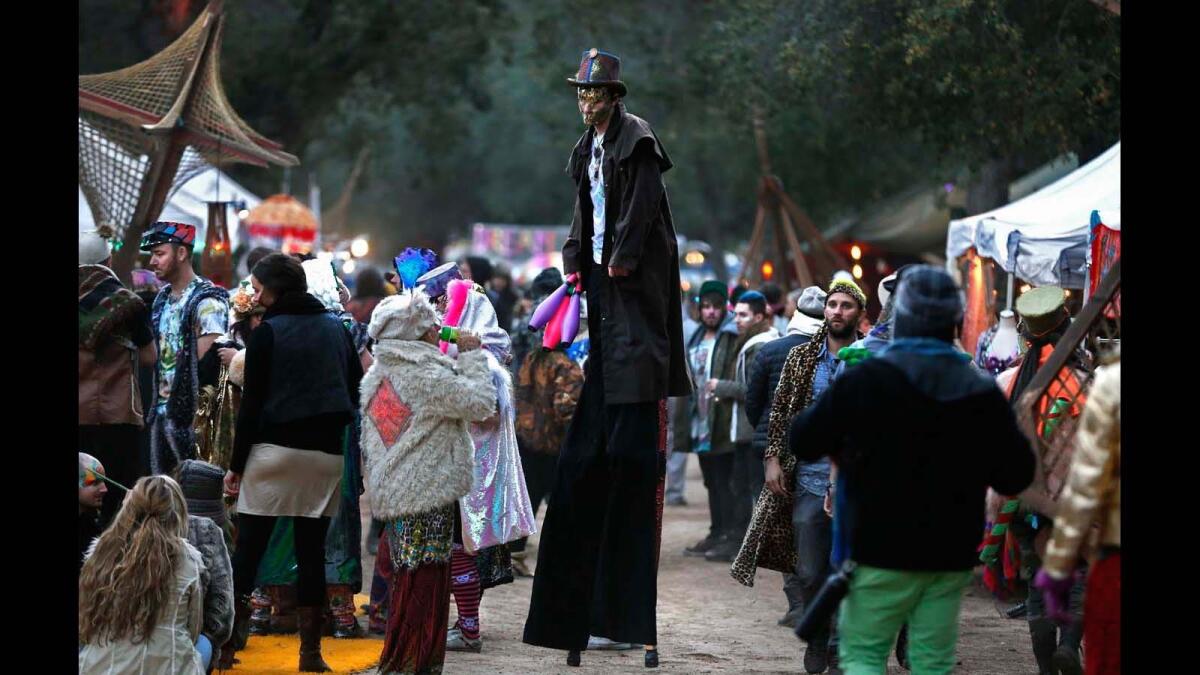
Costumed concertgoers crowd the vendor and food path at the Desert Hearts music festival.
As a balmy Saturday afternoon turned into a frigid Sunday night, the festival moved with own logic. Stilt walkers and fire throwers spun circles in front of campgrounds with names like Shangri-Lawless and Pile Palace. A 30-foot-tall robot made of scrap metal loomed over the RV grounds, inviting red-eyed passersby to ponder its meaning.
Young ravers in unseasonable leotards, or guys in Poseidon costumes with tridents and clamshell tops, fought off the bitter temperatures by dancing even harder. The 45-year-old Reynolds (“The wildest one of all of us,” Lion said, completely earnestly) stirred them into a frenzy behind the decks.
The music stayed in its lane — hard-hitting techno thumps, punctuated with some clever touches like an out-of-left-field Doors remix. Anyone with an allergy to Burning Man’s loopy “Mad Max” aesthetic would find themselves itching a bit, or perhaps craving some light jazz and a hot bath by about hour 48.
But then, around 8 a.m. just when the cold and the crunch of tech-house became too much, there was a team manning a griddle and passing out a free French toast breakfast on paper plates in the middle of the dance floor.
Desert Hearts had something I haven’t felt at a festival in a decade. For a few days, once you got deep into the California woods, it felt like any good thing was allowed.
“We had someone come up to us with their baby and said their child was conceived at Desert Hearts,” said Porkchop. “Like, we created life!”
ALSO:
Cityfox brings high standards (and high prices) to downtown L.A.’s techno scene
Meet booker Tom Windish -- a lifeline for bands who want make a living today
CRSSD Fest brings its own looser vibe to SoCal dance music
More to Read
The biggest entertainment stories
Get our big stories about Hollywood, film, television, music, arts, culture and more right in your inbox as soon as they publish.
You may occasionally receive promotional content from the Los Angeles Times.
